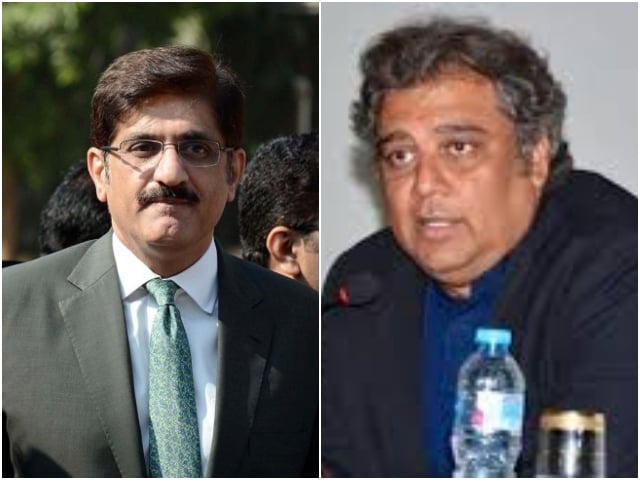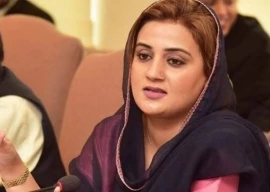
Sindh Chief Minister Murad Ali Shah on Wednesday hit out at Shipping and Maritime Affairs Minister Ali Haider Zaidi for his “irresponsible” claim about the joint investigation team (JIT) report on top Lyari gangster Uzair Baloch, saying that it would let the suspects off the hook.
He also said it was up to the federal government to probe into the JIT report, which Zaidi had claimed was the “original” one instead of the one released by the Sindh government.
A day earlier, the federal minister had claimed that the report released by the Sindh government was not real because the names of key PPP leaders had been “omitted” from it and appealed to the chief justice of Pakistan to take suo motu notice of the “involvement” of Sindh’s ruling party in the crimes committed in Karachi.
The minister then presented what he claimed was the actual JIT report. He later told a TV channel that a man riding a motorcycle came to his house and handed over the “original” report to him.
On Monday, the Sindh government had released the JIT reports on Uzair Baloch, the Baldia Factory fire and the former Fishermen Cooperative Society chairperson Dr Nisar Ahmed Morai.
Speaking to reporters outside the National Accountability Bureau (NAB) office in Islamabad after being quizzed in the Roshan Sindh case by the anti-corruption body’s officials, the Sindh chief minister said it might have made sense if a responsible person had given the JIT report to the minister and he was revealing it now. However, he added, the minister had “acted irresponsibly” by presenting such document and claiming it was the original one.
“Someone comes to him at night on a motorcycle, hands him a paper and the next day he starts hurling allegations in the National Assembly on the basis of that. This is unbecoming of a MNA and a sensible person."
The minister had claimed that the JIT comprised six members and the “original” report only carried the signatures of four members.
Murad said unlike the minister’s claim, there were seven members of the JIT and the report submitted to provincial home department carried the signatures of all them. He added that the report was submitted to the Sindh High Court in a sealed envelope, read by the judges and then returned to the provincial government.
The chief minister further pointed out that the JIT report in Zaidi’s possession mentioned an official from the Crime Investigation Department (CID), which was abolished in 2016 and converted into the Counter-Terrorism Department (CTD).
“The original JIT report has CTD written on it instead of CID. I don’t know how they are making up these things up. I think he is trying to give favours to the suspects in some way.”
Murad maintained that the provincial government had decided not to release the report on the advice of its legal department as it could have “alerted” the suspects.
"Unfortunately, we were under political pressure because of the irresponsible behaviour of Ali Zaidi. The matter was in the courts. I told the attorney general that we will have to make the reports public because we were under political pressure."
After Murad’s media talk, Zaidi again asked the chief justice to take suo motu notice of the reports released by the provincial government. He tweeted that the Nisar Morai JIT report had only been signed by five of the six members on each page, but only four of six on the last page. He again claimed that the Uzair Baloch JIT report had signatures four of the members out of the total six. “It also clearly states on page 2 that it’s in 2 parts,” he added. He accused the PPP of creating doubts on the authenticity of the reports he had shared. “PPP wants the world to accept it!”
Earlier, Murad reached the NAB headquarters in connection with the Sindh Roshan Project case and responded to the queries of the anti-graft watchdog for the alleged illegal awarding of contracts for installing solar street lights in the province.
NAB claims that several companies won contracts worth billions of rupees for the ‘Roshan Sindh’ programme by paying bribes to the tune of Rs90 million.
The probe into the programme is among others taking place as part of the investigation into the mega fake accounts scandal. Murad had appeared before NAB interrogators in connection with the case last month as well.
The Roshan Sindh scheme was approved in 2014 during the tenure of former chief minister Qaim Ali Shah to install 20,000 solar lights by June 2016 in major municipal and town committees across the province at a cost of Rs4 billion.
Another project, estimated at Rs3 billion, was meant to install solar lights in rural areas. This project was approved on the October 26, 2016, and was supposed to be completed by June 2018.
A third project, with a price tag of Rs1.5 billion, was touted as the second phase of the earlier scheme to install solar lights in rural areas. Last year, Qaim Ali Shah also appeared before NAB and submitted answers to 20 questions in the Roshan Sindh programme case.
1729662874-0/One-Direction-(1)1729662874-0-405x300.webp)


1722421515-0/BeFunky-collage-(19)1722421515-0-165x106.webp)

1726722687-0/Express-Tribune-Web-(9)1726722687-0-270x192.webp)

1732103737-0/Copy-of-Untitled-(55)1732103737-0-270x192.webp)









COMMENTS
Comments are moderated and generally will be posted if they are on-topic and not abusive.
For more information, please see our Comments FAQ